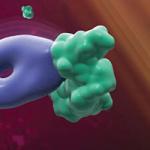
Freddy E. Escorcia, M.D., Ph.D.
Lasker Clinical Research Scholar
Molecular Imaging Branch
NCI/CCR
Research Topics
The Laboratory of Molecular Radiotherapy leverages modern technology to achieve the following:
- Identify promising tumor- or tumor microenvironment-selective targets
- Discover low molecular weight biomolecules specific to these targets
- Design, engineer and test radioconjugates in vitro and in vivo
- Translate lead radioconjugates to first in human clinical trials
Current efforts are focused on engineering radioconjugates to yield molecular PET or SPECT imaging agents for hepatocellular carcinoma (HCC), which is critical in early diagnosis and surveillance of this disease and suboptimal with existing conventional methods, especially following local treatments. Importantly, our efforts toward the development of novel imaging agents for HCC yield insights which we can use to inform development of therapeutic agents. While our focus is on radiopharmaceuticals, what we learn can be translated to similar technologies including antibody- or peptide-drug conjugates, and have applications beyond HCC as well.
Because we know that radiopharmaceutical therapy is unlikely to result in cures, future efforts in identifying relevant targetable cellular resistance pathways will help guide rational treatment combinations to improve the outcomes for patients.
Biography
Dr. Freddy E Escorcia is a Lasker Clinical Scholar, and Investigator within the Radiation Oncology and Molecular Imaging Branches at the Center for Cancer Research within the National Cancer Institute. There, he treats patients with malignancies amenable to radiotherapy, including hepatocellular carcinoma (HCC). He is also the head of the Laboratory of Molecular Radiotherapy, which develops targeted radiopharmaceutical diagnostics and therapeutic agents, or “theranostics,” for human cancers, with particular focus on HCC. He is also the lead principal investigator on a phase 2 clinical study evaluating efficacy of novel positron emission tomography (PET) imaging agent in patients with HCC (NCT05009979).
Originally from Nicaragua, Dr. Escorcia earned his BS in Bioengineering and Chemistry at the University of Illinois at Urbana-Champaign. He then went on to the Tri-Institutional MD/PhD program of Weill Cornell Medical College, Memorial Sloan Kettering, and The Rockefeller University, earning his PhD in Cancer Pharmacology. His thesis work involved the design, engineering and characterization of tumor vasculature-targeted alpha particle-emitting radioconjugates in models of colorectal cancer. Dr. Escorcia completed his intern year and Radiation Oncology residency at Memorial Sloan Kettering, as well as a postdoctoral fellowship developing pancreatic adenocarcinoma-targeting radiopharmaceuticals.
During his time at the NCI, he has earned Outstanding Mentor award, Distinguished Scholar, and FLEX Synergy Award 2019, Director’s Innovation Award in 2022, American Chemical Society Early Career Innovator in Bioconjugate Chemistry in 2023, and a Federal Technology Transfer Award in 2024. He is an active member of American Society for Radiation Oncology (ASTRO), serving on the Advancing Research Talent Committee and as Vice Chair of the Radiopharmaceutical Therapy Committee. When not actively involved in the lab or clinic, Dr. Escorcia enjoys reading, weight-training, and spending time with his wife and two daughters.
Selected Publications
- Escorcia FE, Postow MA, Barker CA. Radiotherapy and Immune Checkpoint Blockade for Melanoma: A Promising Combinatorial Strategy in Need of Further Investigation. Cancer J. 2017;23(1):32-39.
- Mulvey JJ, Villa CH, McDevitt MR, Escorcia FE, Casey E, Scheinberg DA. Self-assembly of carbon nanotubes and antibodies on tumours for targeted amplified delivery. Nat Nanotechnol. 2013;8(10):763-71.
- Scheinberg DA, Villa CH, Escorcia FE, McDevitt MR. Conscripts of the infinite armada: systemic cancer therapy using nanomaterials. Nat Rev Clin Oncol. 2010;7(5):266-76.
- Escorcia FE, Henke E, McDevitt MR, Villa CH, Smith-Jones P, Blasberg RG, Benezra R, Scheinberg DA. Selective killing of tumor neovasculature paradoxically improves chemotherapy delivery to tumors. Cancer Res. 2010;70(22):9277-86.
- Massé E, Escorcia FE, Gottesman S. Coupled degradation of a small regulatory RNA and its mRNA targets in Escherichia coli. Genes Dev. 2003;17(19):2374-83.
Related Scientific Focus Areas

Biomedical Engineering and Biophysics
View additional Principal Investigators in Biomedical Engineering and Biophysics



Molecular Biology and Biochemistry
View additional Principal Investigators in Molecular Biology and Biochemistry

This page was last updated on Wednesday, February 12, 2025